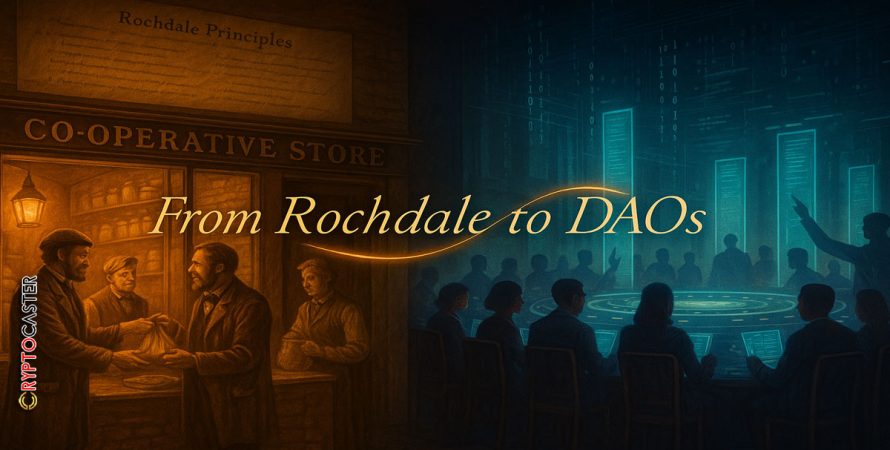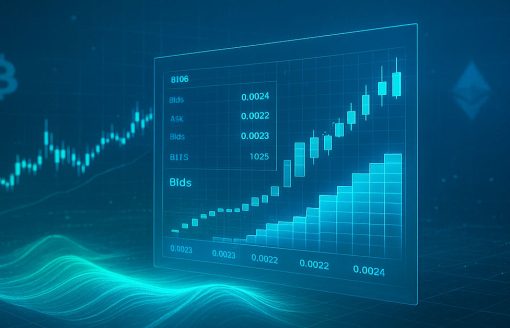When blockchain enthusiasts talk about DAOs (Decentralized Autonomous Organizations), the conversation often feels futuristic: smart contracts, governance tokens, global participation. Yet the roots of this new organizational form stretch back nearly two centuries to a group of weavers in a small industrial town in England. The Rochdale Society of Equitable Pioneers, founded in 1844, did not have blockchain or cryptography—but they did have a radical vision of economic democracy.
Tracing the line from the early cooperative movement to today’s DAOs helps us see not only what has changed, but what remains constant: the struggle to design systems where ownership, decision-making, and benefit are shared among the participants rather than captured by a few elites.
Stay in the know on crypto by frequently visiting Crypto News Today
🌱 The Historical Roots of Business Cooperatives
Ancient Traditions of Mutual Aid
The cooperative spirit long predates the industrial era. Ancient guilds, collective farms, and mutual aid societies across Africa, Asia, and Europe organized people around shared resources and responsibilities. These groups weren’t formally “cooperatives” in the modern sense, but they embodied the principle of solidarity—pooling risk and distributing benefit.
Medieval guilds in Europe, for instance, regulated trades, provided social insurance for members, and often supported widows and orphans. Across the African continent, indigenous savings groups (rotating credit associations) operated on similar principles: collective trust, mutual oversight, and benefit distribution.
CryptoCaster Quick Check:
The Industrial Shock and the Birth of Modern Cooperatives
The 18th and 19th centuries upended these older forms of community-based economy. Industrialization brought new wealth but also harsh inequality, wage exploitation, and inflated food prices. Workers had little protection and little say in the new order.
Out of this context, the modern cooperative emerged. Instead of accepting monopoly prices and adulterated goods, groups of workers banded together to buy, sell, and even produce collectively. They weren’t waiting for charity; they were redesigning the economic system to serve their communities.
The Rochdale Society of Equitable Pioneers (1844)
In 1844, 28 working-class men in Rochdale, England, pooled their modest resources to open a cooperative store. Their guiding principles would echo across the world:
- Open Membership – anyone could join.
- Democratic Control – one member, one vote.
- Equitable Contribution and Benefit – profits returned to members in proportion to their patronage, not their capital.
- Transparency and Education – records were open, and literacy and training were prioritized.
- Neutrality and Community Focus – politics and religion took a back seat to collective welfare.
These Rochdale Principles became the DNA of cooperatives worldwide. Agricultural co-ops, credit unions, housing co-ops, and retail co-ops all borrowed this framework, scaling it to millions of people across continents.
Cooperatives in the 20th Century
By the mid-20th century, cooperatives were global economic actors. From dairy co-ops in Denmark to credit unions in North America to worker co-ops in Latin America, they showed that businesses could thrive without the typical shareholder model.
The key insight: ownership and governance need not be concentrated. A business could be for-profit and for-community at the same time.
🔗 Enter the DAO: A Digital Cooperative
Fast-forward to the 21st century. New technologies—blockchain, smart contracts, cryptography—offered new ways to encode trust and collective action. Out of this emerged the DAO: a digital organization without traditional management, run instead by rules inscribed in code.
DAOs aren’t simply tech experiments. They represent a renewed attempt to tackle old questions: Who owns? Who decides? Who benefits?
What is a DAO?
A Decentralized Autonomous Organization is a blockchain-based entity governed by its members through tokens and on-chain voting. Decisions are executed automatically by smart contracts, reducing the need for intermediaries.
- Ownership: determined by tokens.
- Governance: proposals and votes are recorded transparently on-chain.
- Trust: shifted from human managers to immutable code.
- Global Reach: anyone with an internet connection can participate.
In theory, DAOs create an internet-native cooperative where community members collectively steer the mission, allocate funds, and share outcomes.
DAO vs Cooperative: The Parallels
| Principle | Cooperative (Rochdale model) | DAO (Blockchain model) |
|---|---|---|
| Membership | Open to community members | Open to token holders or contributors |
| Decision-making | One-member-one-vote | Token-weighted voting (sometimes quadratic voting to reduce whale power) |
| Profit/Surplus Sharing | Based on patronage (use of services) | Based on token holdings, staking, or activity |
| Trust Mechanism | Legal charters + community trust | Smart contracts + cryptographic guarantees |
| Transparency | Records open to members | Transactions and proposals visible on-chain |
| Challenges | Bureaucracy, scaling issues | Token concentration, regulatory gray areas |
⚖️ The Shared Struggle: Democracy at Scale
Both cooperatives and DAOs face a common dilemma: how to balance participation with efficiency.
- In co-ops, “one member, one vote” can be slowed by bureaucracy, especially as organizations grow.
- In DAOs, “one token, one vote” risks plutocracy, where wealthy whales dominate decision-making.
Each system has experimented with hybrid solutions: representation, weighted voting, or reputation-based governance. Neither model has perfected the art of democracy at scale, but both are live laboratories for the future of collective power.
🌍 Global Resonance: From Villages to the Metaverse
The cooperative model resonated because it fit local contexts. Farmers in Kenya pooled resources through dairy co-ops; credit unions in the U.S. offered working-class families financial autonomy; worker-owned collectives in Spain’s Basque region (like Mondragón) built entire industrial ecosystems.
DAOs, too, are contextual. Some run global investment funds (e.g., The DAO, ConstitutionDAO). Others manage decentralized protocols (MakerDAO, AaveDAO). Some are purely social (Friends With Benefits DAO).
Both models show that collective ownership can adapt across time, geography, and technology.
🚨 Challenges and Critiques
Cooperatives
- Susceptible to political capture.
- Struggle to attract external capital.
- Often seen as slower and less competitive than corporate rivals.
DAOs
- Vulnerable to smart contract bugs and hacks (remember The DAO hack of 2016).
- Concentration of tokens undermines decentralization.
- Unclear legal status in many jurisdictions.
- Cultural barrier: not everyone understands blockchain or wants to manage governance directly.
Both face the eternal tension between ideals and practice. Democracy is messy, whether offline or on-chain.
🔮 The Future: Convergence Ahead?
It’s not hard to imagine a near future where traditional cooperatives adopt DAO technology. Imagine a rural agricultural co-op issuing governance tokens to its members, enabling instant voting via smartphone and transparent distribution of profits through blockchain rails.
Conversely, DAOs could learn from co-ops’ long history of balancing values with practicality—especially around member education, neutrality, and community focus.
If co-ops were the analog era’s experiment in shared economic power, DAOs are the digital continuation.
Closing Thoughts
The thread that ties Rochdale’s weavers to Ethereum developers is simple but profound: people refuse to accept systems where they have no voice or stake. Whether through storefront co-ops in 1844 or DAOs in 2025, the pursuit of economic democracy continues to reshape our institutions.
For all the hype around code and cryptography, DAOs remain part of a much older story—one where communities reclaim the right to own, decide, and benefit together.
If this article brought you clarity, insight, or value—support the work that made it possible.
At CryptoCaster, we report on Web3, crypto markets, and institutional finance with no billionaire owners, no shareholders, and no hidden agenda. While mainstream media bends toward Elon Musk, BlackRock, and JPMorgan narratives, we stay focused on what matters: truth, transparency, and the public interest.
We don’t just cover the headlines—we investigate the power structures behind them. From FTX and Ripple to the quiet push for CBDCs, we bring fearless reporting that isn’t filtered by corporate interests.
CryptoCaster is 100% paywall-free. Always has been. To keep it that way, we depend on readers like you.
If you believe independent crypto journalism matters, please contribute—starting at just $1 in Bitcoin or Ether. Wallet addresses are below.
Your support keeps us free, bold, and accountable to no one but you.
Thank you,
Kristin Steinbeck
Editor, CryptoCaster
Support CryptoCaster: The Unfolding of Money
At CryptoCaster.world, we’re dedicated to bold journalism, sharp insights, and fearless commentary across blockchain, Web3, and crypto markets. Your **Bitcoin contributions** help us stay independent and continue delivering signal over noise.
🚨 CryptoCaster does not offer investment advice. Always DYOR—volatility is real, and risk tolerance matters.
Support our mission. Contribute BTC today.
🔗 Bitcoin Address:
3NM7AAdxxaJ7jUhZ2nyfgcheWkrquvCzRm
Thank you for backing our journalistic lens as we chronicle the Unfolding of Money — a saga still being written in real time.![]()
CRYPTOCASTER HEATMAP






